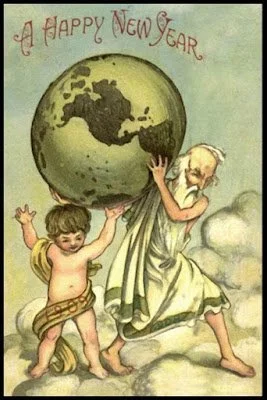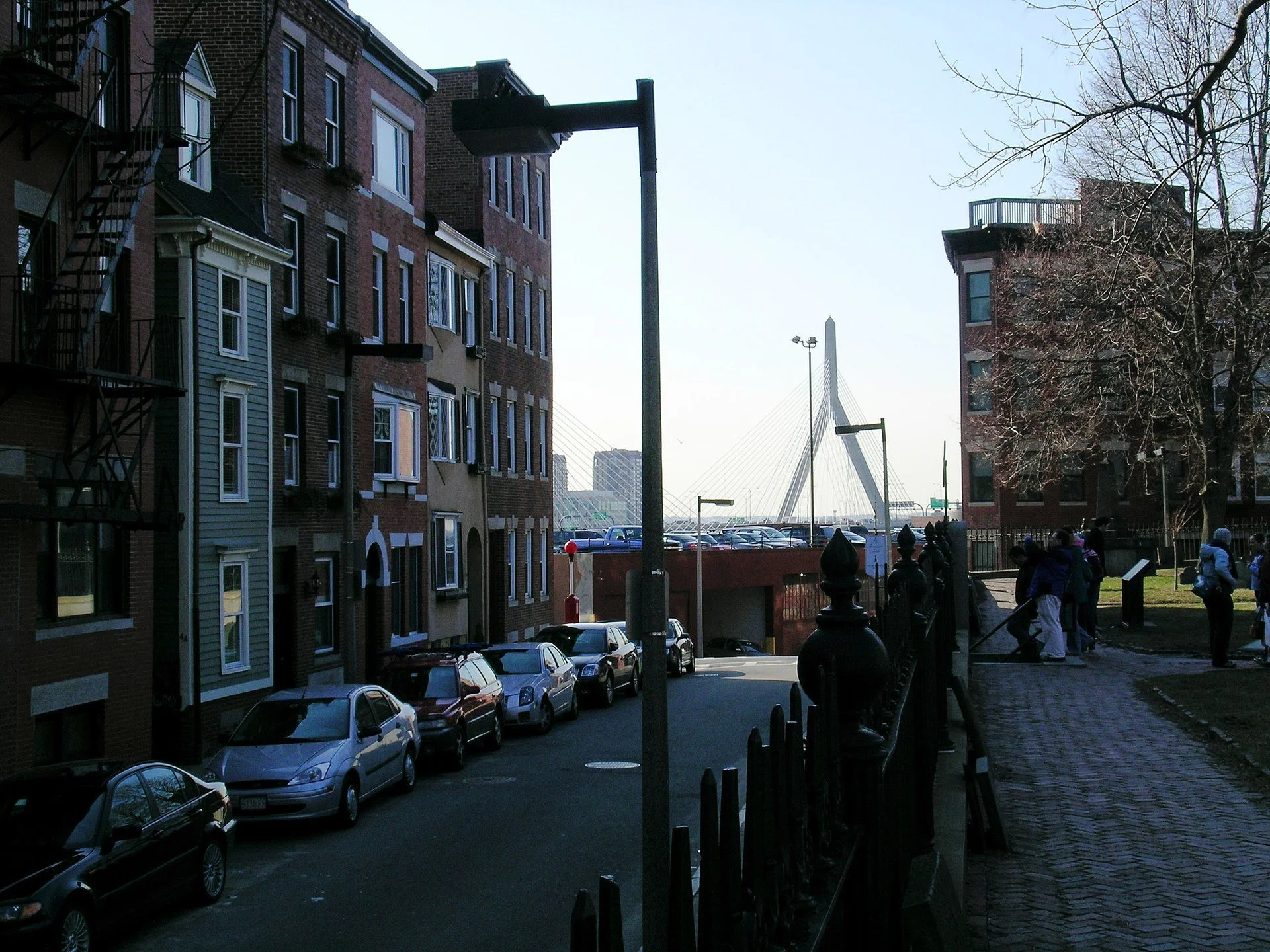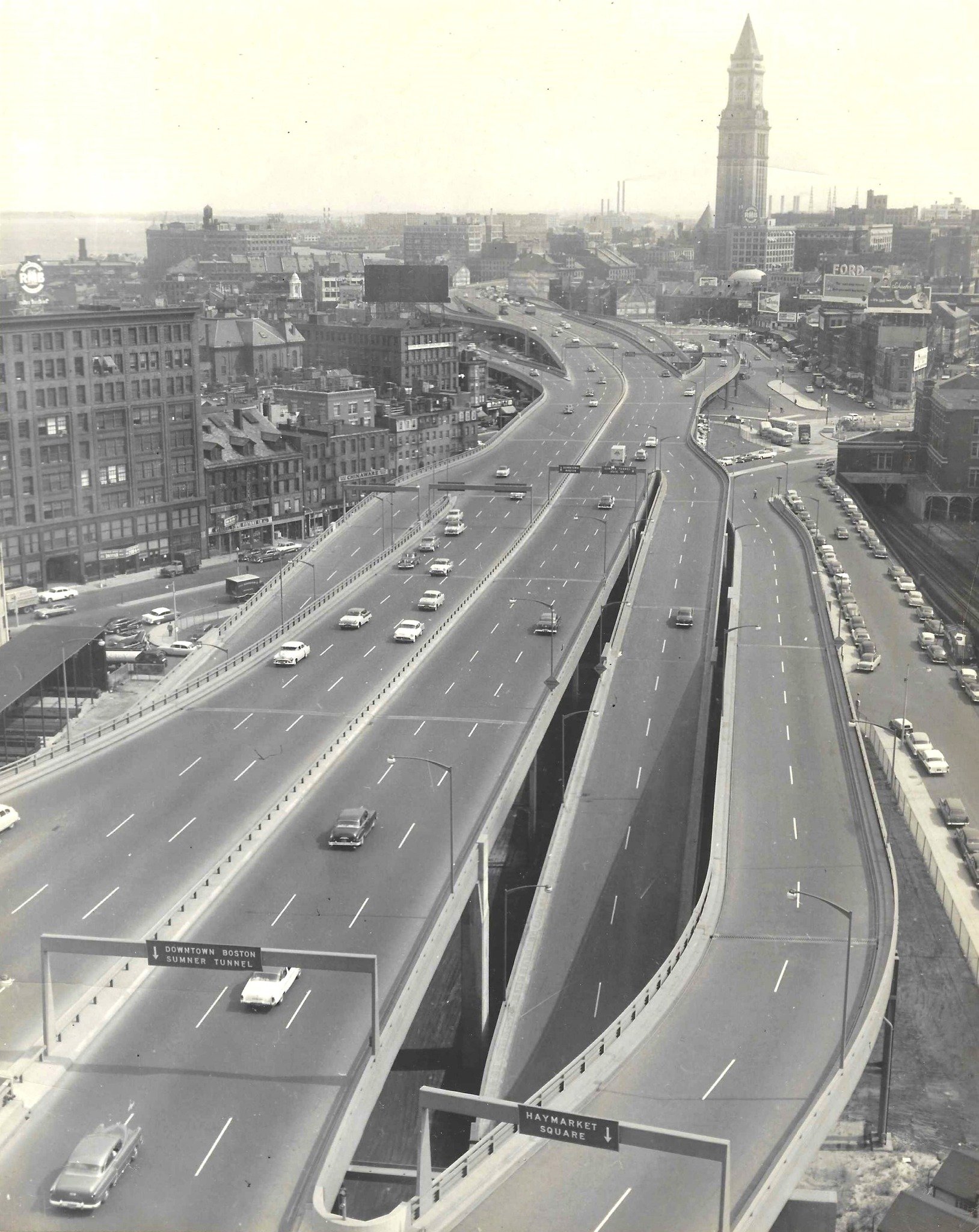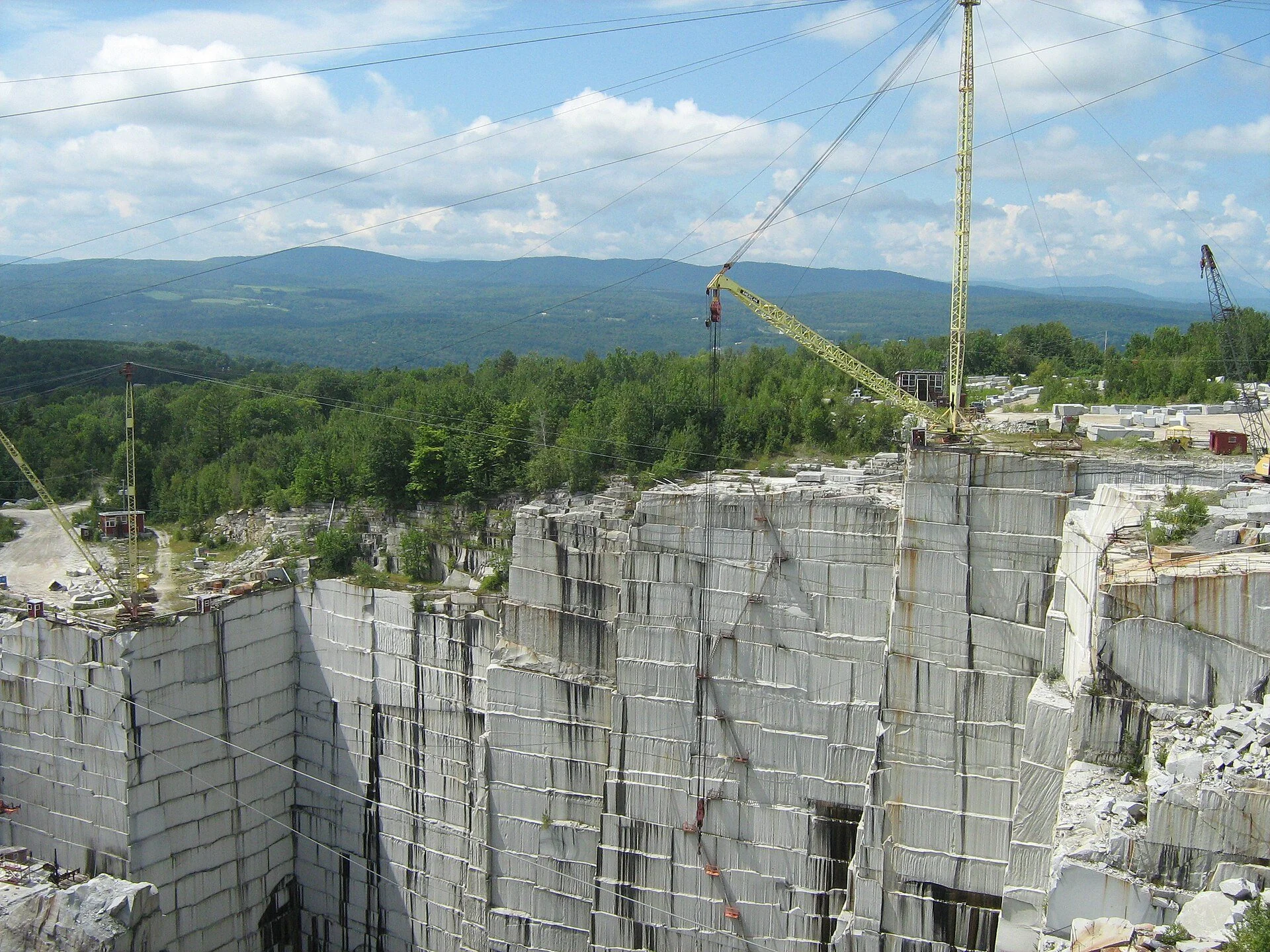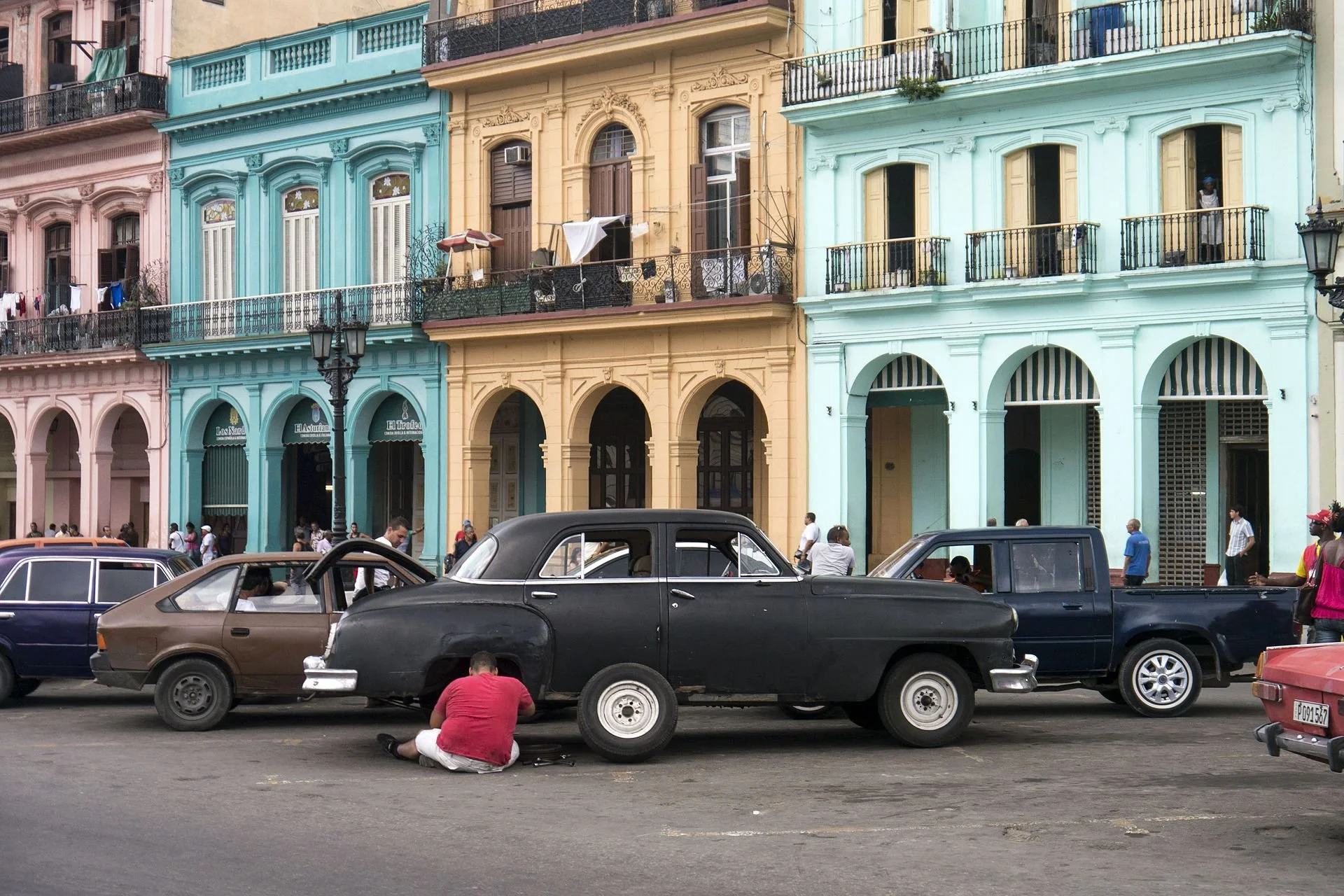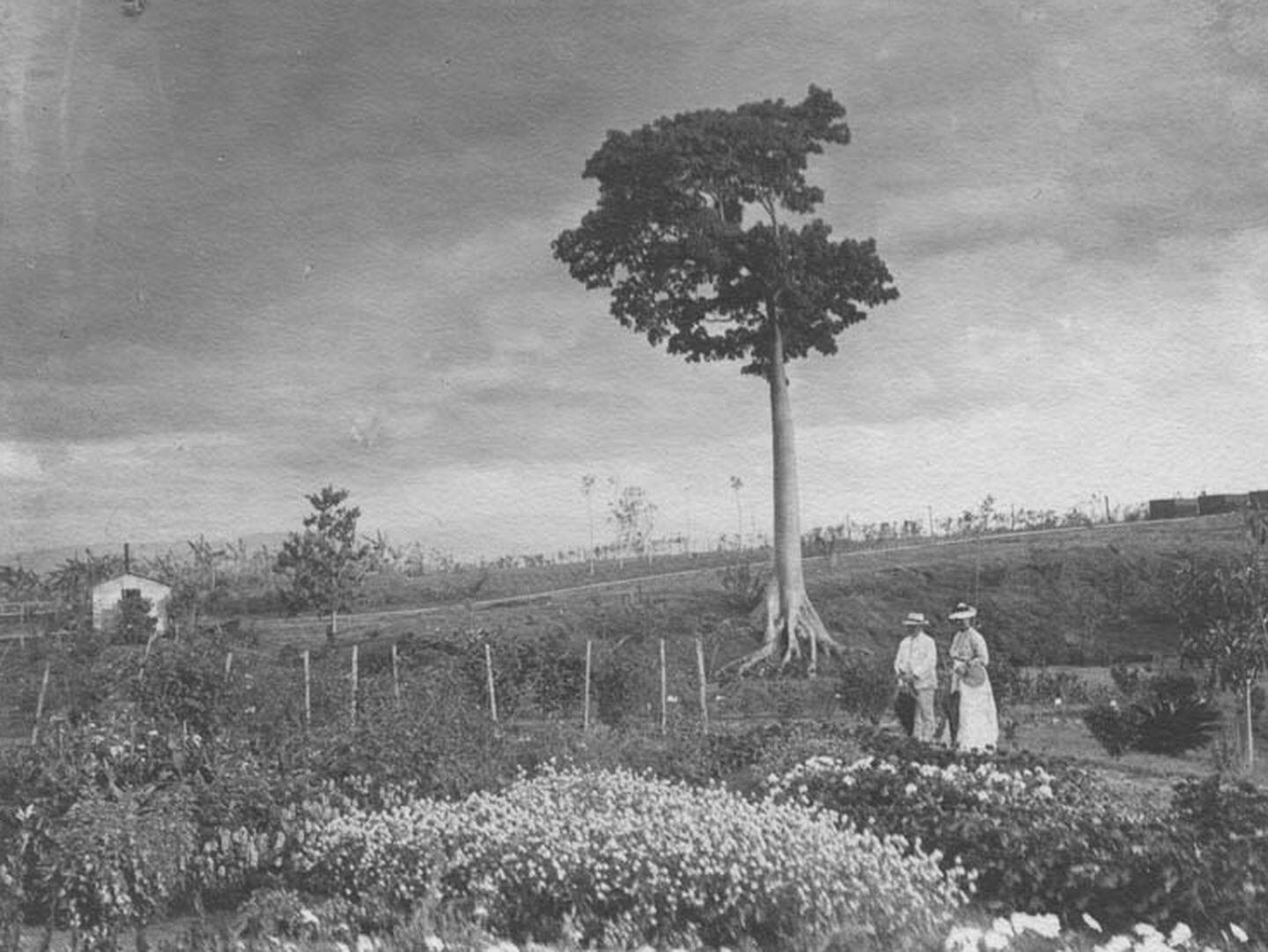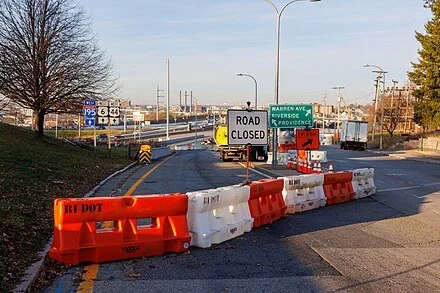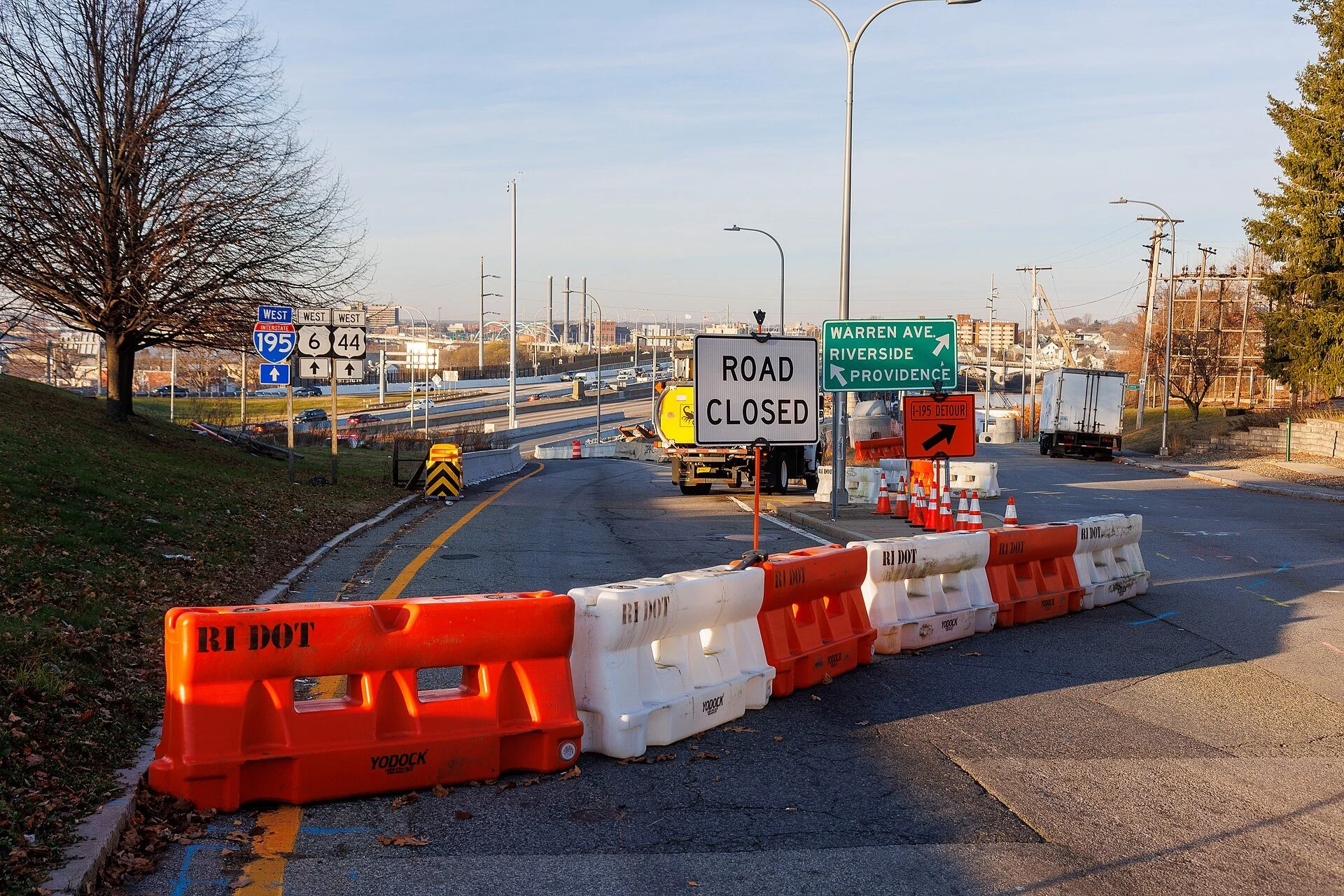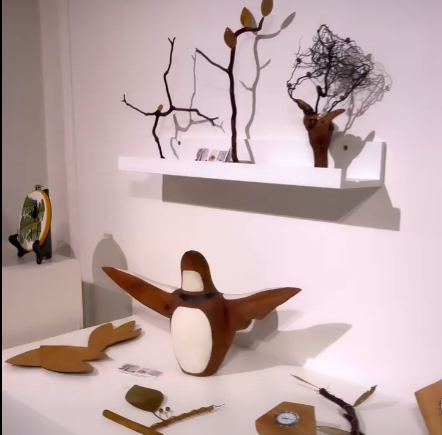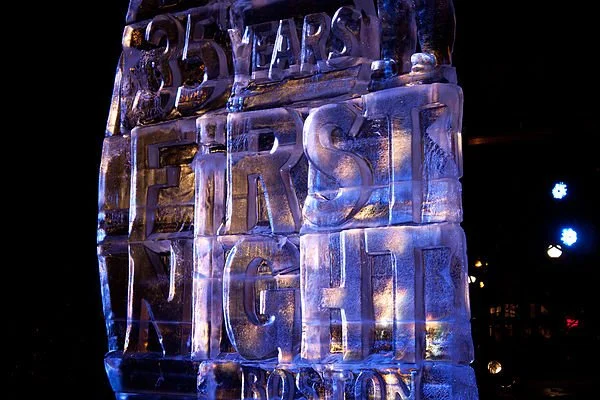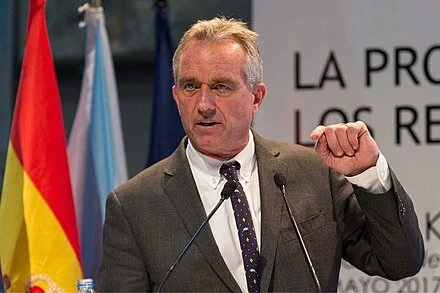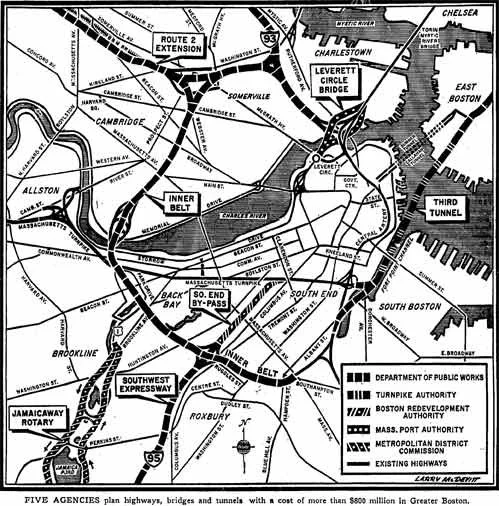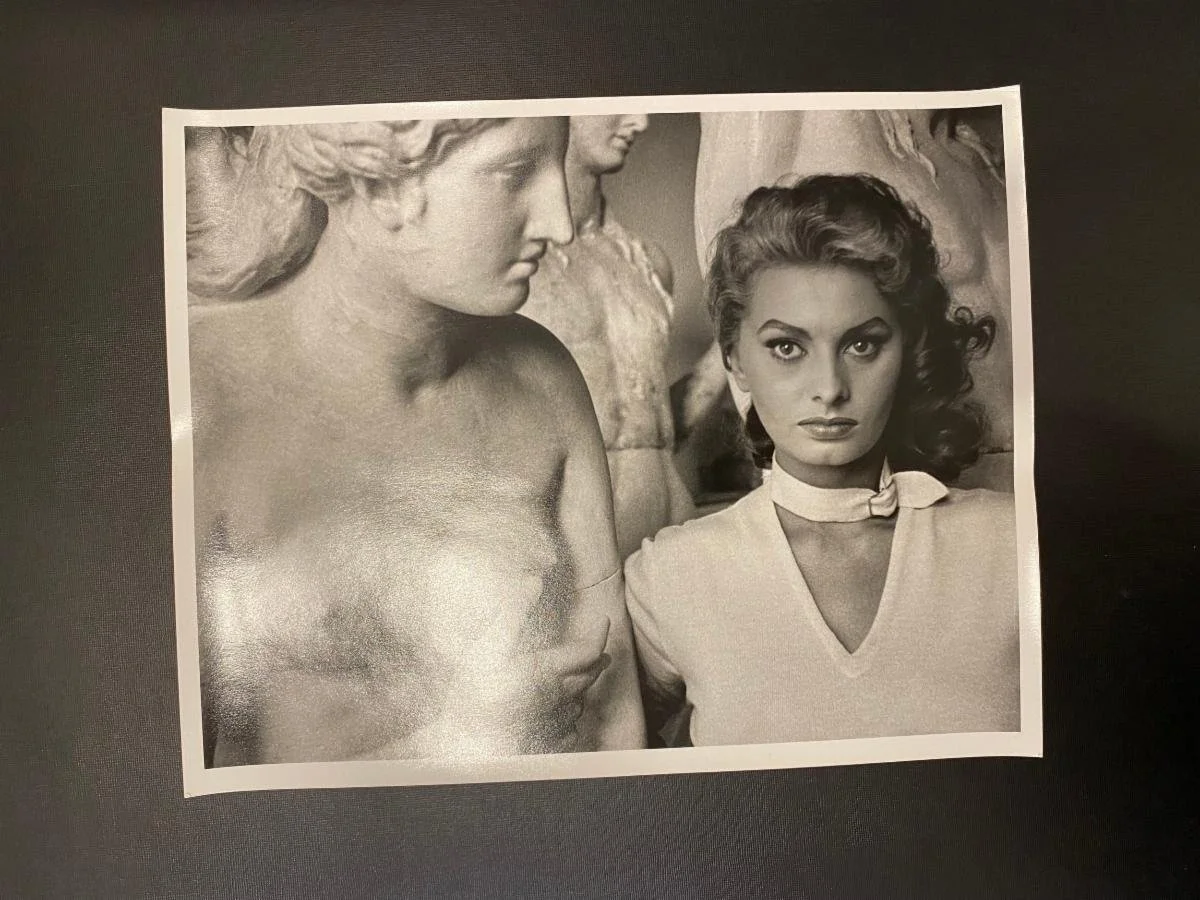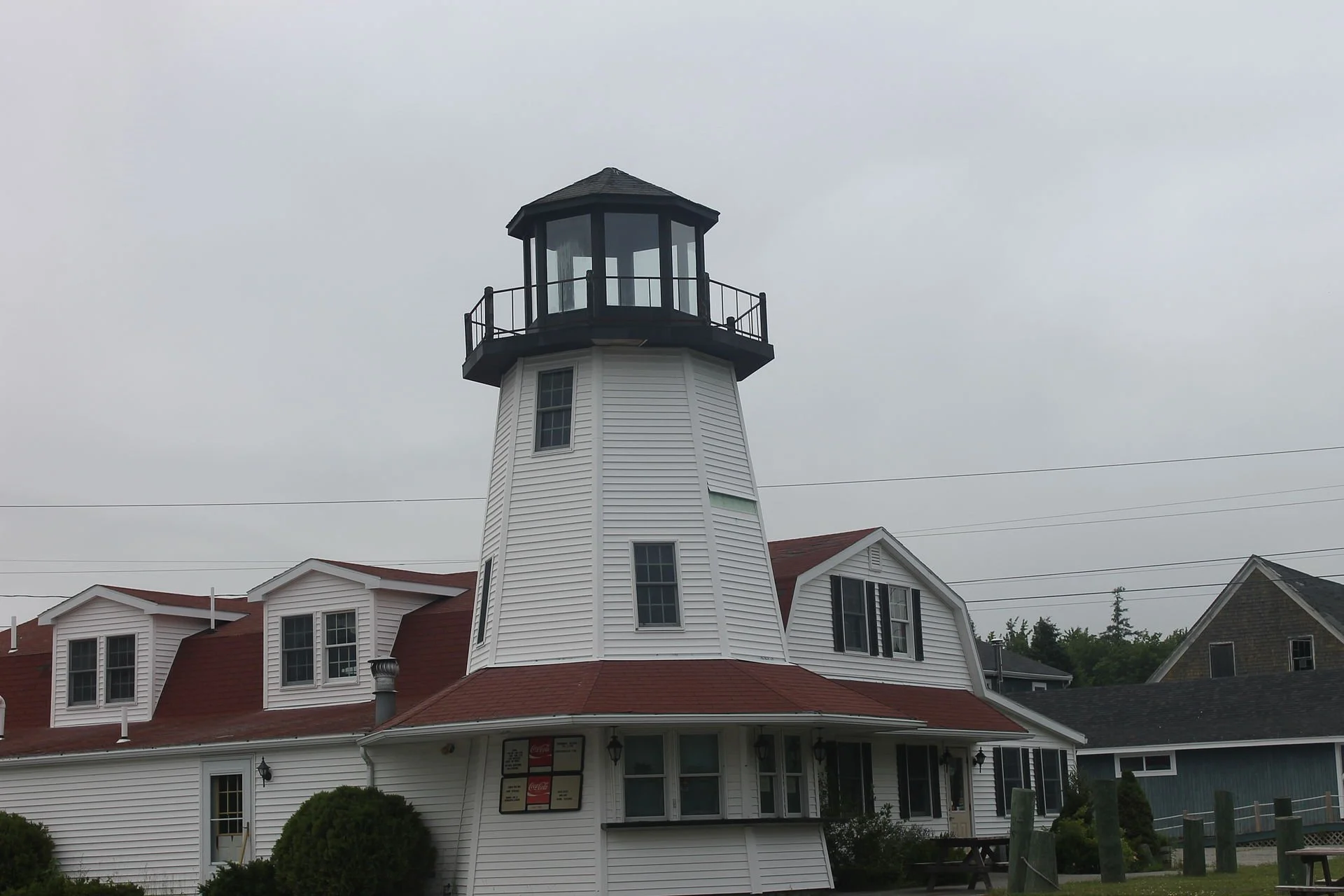
‘The burden of a year'
“Father Time and Baby,’’ 1909
What can be said in New Year rhymes,
That’s not been said a thousand times?
The new years come, the old years go,
We know we dream, we dream we know.
We rise up laughing with the light,
We lie down weeping with the night.
We hug the world until it stings,
We curse it then and sigh for wings.
We live, we love, we woo, we wed,
We wreathe our prides, we sheet our dead.
We laugh, we weep, we hope, we fear,
And that’s the burden of a year.
‘‘The Year,’’ by Ella Wheeler Wilcox (1850-1919). She spent much of her adult years living in Branford, Conn.
Branford Town Hall
— Photo by Kenneth Zirkel
Mountain marvels
The late lamented gondolas at Wildcat Mountain, in New Hampshire. Working from 1958-1998, they were the first ski area gondolas in the United States. They were replaced by a high-speed chair-lift system.
“Mount Lafayette in Winter” (1870), by Thomas Hill (1829-1908). The mountain, at 5,249 feet, is the highest peak in New Hampshire’s Franconia Range.
Thin religiosity and archaic roads
On a typically narrow Boston road — Hull Street. From left to right: the Skinny House, the Leonard P. Zakim Bunker Hill Memorial Bridge and the Copp's Hill Burying Ground. The Skinny House, built soon after the Civil War, is reportedly the most narrow in Boston, and is said to have been built to spite the neighbors.
“Even after thirty years, I still think New Englanders sound funny, that they expect too much of the Red Sox, that their religiosity is more procedural than deeply felt, and that their highways are built with the conviction that automobiles could not possibly replace the horse-drawn buggy, and therefore need not be wide, permanent, or especially well-designed.’’
-- C. Michael Curtis (1934-2023) in New England Stories (1992). A New York City native, he was the long-time fiction editor of The Atlantic (magazine ), which was based in Boston from its founding, in 1857, until it was moved to Washington, D.C., in 2006
First Unitarian Church of Providence.
‘Light, space and poetry’
“Quarry Winter” (oil on linen), by Thomas Torak, at Helmholz Fine Art, Manchester, Vt.
He says:
“Luminosity, atmosphere, poetry, craftsmanship, joy, life. These are the cast of characters in my paintings. Most artists use light, color and design to express what they want to say about the objects in their paintings, I do just the opposite in my work. I use subject matter, apples, flowers, trees, mountains, portraits and nudes to explore the possibilities of light and space and poetry. Some artists paint in prose, some paint in poetry. There are artists who feel the more details they paint, the more accurately they describe something, the more successful their painting will be. Others, like myself, prefer to express things in the most elegant way possible.’’
Marble quarry in Dorset, Vt.
Woodbury Granite Co, around 1900.
Rock of Ages granite quarry in Graniteville, Vt.
— Photo by Mfwills
Chris Powell: Criminal convictions shouldn’t be a secret
MANCHESTER, Conn.
Connecticut law is full of mistaken premises, and more will be added in January when the criminal records of an estimated 80,000 people will be privatized -- not exactly erased but removed from public access under what is being called the “clean slate” law. The records involve convictions for misdemeanors more than seven years old and "low-level" felonies more than 10 years old committed by people not convicted of anything since.
The rationale for the new law is, first, that it's not fair that old convictions should be known, and, second, that public knowledge of convictions is a huge impediment to people seeking housing and employment.
But why shouldn't convictions be impediments to getting housing and jobs?
Since most criminal charges are substantially discounted in plea bargaining to avoid trials, most people who have been convicted have already received extra consideration from the government. So what is fair about eliminating all trace of their discounted offenses?
What is fair about depriving landlords and employers of basic information about people for whom they may become responsible?
What is fair about keeping people ignorant of what their government has done?
Of course, society also has an interest in having everyone honestly employed. But people have to compete for jobs and housing, so why shouldn't people who have not committed crimes have an advantage over former offenders? Why shouldn't former offenders have to try harder to show they are worthy of trust?
Criminal convictions are not the biggest impediment to finding housing these days. The biggest impediment is the sharply rising price of housing that results from general inflation and the general scarcity worsened by municipal zoning. Connecticut is said to need at least 90,000 more housing units for its current population. If the state suddenly had another 390,000 units, rents would be much lower and landlords wouldn't be so picky about tenants. Eliminating public access to conviction records will not build more housing.
Criminal convictions are probably not the biggest impediment to obtaining jobs either.
Gov. Ned Lamont himself hinted as much this month when he announced that the "clean slate" law would take effect in January. The governor noted that Connecticut has a labor shortage and "desperately" needs former offenders in the workforce. The worse the shortage of labor, the more that employers will be willing to overlook old convictions, if former offenders can demonstrate their ability to do the job -- and ability to do the job is almost certainly the biggest impediment to employment for former offenders.
Lack of a good upbringing, education, and job skills push people toward crime, and Connecticut, with a welfare system based on destroying families and a school system based on social promotion, is full of people who lack what they need to support themselves. Indeed, if one's education and job skills are strong enough, even the worst offenses may be readily forgiven.
Such is the lesson of the rocket scientist Wernher von Braun, the first hero of the United States space program.
Von Braun's career during World War II was with the Nazi government of Germany. He designed the infamous V-2 rocket bomb, became a major in the criminal SS military force, and was awarded the Iron Cross by Adolf Hitler himself. (Years later a biography of von Braun was titled "I Aim at the Stars," prompting the American comedian Mort Sahl to say it should have been subtitled "But I Sometimes Hit London.")
Nevertheless the U.S. government hired von Braun as soon as the war ended. His rocketry skills overcame any concern about his record as a Nazi criminal mastermind.
Instead of presuming that erasing criminal records will somehow qualify people for housing and jobs, state government should provide a year or so of paid employment, basic medical insurance, and rudimentary housing for former offenders who are not yet able to support themselves, allowing them to build the creditable record everyone needs to gain employment and housing.
Better still, state government should fix the failures of its welfare and education systems.
Chris Powell has written about Connecticut government and politics for many years. (CPowell@cox.net).\
Llewellyn King: My Christmas in poor, beautiful Cuba
These Spanish Colonial era buildings are a common sight across Havana, along with old cars.
— Photo by Bryan Ledgar
There was much business done in Cuba by New England enterprises, especially in sugar but also in tobacco and fruit. Here’s the Soledad plantation of Belmont, Mass.-based sugar mogul Edward F. Atkins. In the late 19th Century, Atkins was a dominant force in the U.S.-Cuban sugar market. His firm, E. Atkins & Co., established sugarcane plantations along the southern coast of Cuba near the cities of Cienfuegos and Trinidad. From the 1840s through the 1920s, the Atkins family operated their sugar business on the island, seeing it through the abolition of slavery, Cuba's fight for independence from Spain, and the changing agricultural and industrial practices of sugar production.
The huge and Boston-based United Fruit Co. owned or leased many properties in Cuba.
I have had a hankering to go back to Cuba. I went there with other journalists on a trip organized by the Center for Strategic and International Studies in the 1980s; and again on a National Press Club trip in 2003.
Over Christmas I went back, just to Havana, that dowager city, and lost myself in the best of Cuba: its architecture, its food, its music and its people.
But around me were plenty of signs of the other Cuba, the Cuba which is in extremis — the Cuba which is driving its citizens to leave in record numbers.
In 2022, by some accounts, about 400,000 Cubans left for work and a new life wherever in the world they could find it. The Customs and Border Protection agency estimates that in a recent two-year period, 425,000 sought entry to the United States.
Many Americans are surprised to hear that you can travel easily to Cuba these days. The confusion arises as the law seems to say “no,” but the regulations posted by the Treasury Department say “yes.”
My wife and I went through a commercial Cuba travel service called Cuba Explorer. We didn’t want to go as journalists; we wanted to take a quiet look at Havana, not through the eyes of officialdom. We signed up and so did two friends, a retired doctor and his wife.
The tour company arranged our Cuban visa and the “Certificate of Legal Cuba Travel,” a U.S. requirement. All we did was buy our tickets on American Airlines, which operates daily service from Miami. Delta, Southwest and JetBlue and also fly to Havana from various cities.
Border formalities are no more difficult than they are going to any country — say, Mexico or the United Kingdom.
Havana — and some of the smaller colonial towns which I visited previously — is a delight. It is among the great “built cities” of the world, like Paris, Vienna and St. Petersburg. However, as Havana is compact, it is easily seen; it is the kind of place you feel you can get your arms around.
The grandeur of its colonial past, its wealth of another time, is everywhere. So is the poverty of today. Some streets are sad, indeed, with all the manifestations of poor countries: people picking over garbage, pedal carts, even bullock carts. There are few overweight people and while Cuban food is complex and sophisticated, I’m told that Cubans survive on rice and beans.
Cubans also queue. Jokingly, one Cuban told me, “When we see a line, we go and stand in it — must be something good and, like all good things here, in short supply.”
Food for those outside the dollar-driven tourist economy is a struggle, as are medicines and simple things, like a favorite shampoo or paper products of all kinds. For travelers, one of the pleasures of Havana is that you always get a cloth napkin, not of choice but of necessity. Our new, comfortable hotel ran out of toilet paper. The American obsession with carrying Kleenex came in handy.
The 1950s cars are as plentiful as ever, but many are reengineered with modern Japanese or Russian engines; some declare they are all original parts and use Cubans abroad to scavenge junk yards and send parts back in relatives’ luggage.
The sanctions, with small modifications, have lasted since 1962, and are the longest-ever in U.S. history — and they haven’t worked. They haven’t brought down the Communist Party, freed the press or made the life of Cubans any better. Instead, they have subtracted hope.
The embargo is a peculiar cross that Cuba alone bears, especially when you think of the many dictatorial regimes we tolerate and befriend.
The Hill reported that Mexican President Andres Manuel Lopez Obrador told President Biden in a phone call that he could help reduce migration in the region if he could loosen the sanctions on Cuba. It is hard to find a Cuban who wants to leave the island, but wouldn’t if he or she could.
After 20 years, I had hoped to find a more prosperous Cuba, but it hasn’t happened. The small areas of free enterprise allowed by the state have created little oligarchies. Taxi drivers and waiters make much more money than doctors and engineers. These professionals count among Cuba’s exports, its brain drain. On the upside, there are many private restaurants with a thriving food culture for those who can afford it.
The fault is the failed Cuban communist model, but the United States hasn’t helped. Graham Greene, the great British writer, who penned The Power and the Glory, about the Mexican Revolution — from 1910 to 1920 —pointed out that it failed without the aid of an American embargo.
I have felt, now for 40 years, that Cuba would throw off communism if we let it alone, and got rid of the embargo, which is more about U.S. politics than the politics of Cuba.
Meanwhile, do visit Cuba while you can. It is a treat for the eyes, the ears and the palate. You won’t regret it.
Llewellyn King is executive producer and host of White House Chronicle, on PBS. His email is llewellynking1@gmail.com, and he’s based in Rhode Island and Washington, D.C.
Take the Little Circle Route
The westbound I-195 entrance ramp in East Providence was closed due to the Washington Bridge closure.
Adapted from Robert Whitcomb’s “Digital Diary,’’ in GoLocal24.com
The economic and psychological damage from the ongoing Washington Bridge repair job will, it seems, last for months. I had thought that perhaps the traffic mess would have been smoothed out a lot within a few days. But on Dec. 20, in clear weather and not during commuting hours -- we saw a traffic jam extended for miles on Route 195 West as we headed on the highway’s eastbound side, which we got to via a confusing and circuitous route in always-problematical East Providence. Clearer signage, please! We were bogged down for quite a while on Broadway in that speed-trap-rich city, with its ingeniously confusing signs. Pretty tough to speed there now, not that you should!
So we decided to return to Providence from our meeting in Dartmouth, Mass., via 195 West and then 24 North to 495 North from which we got on 95 South. The trip took a little over an hour and a half. The detour was well worth it. Drivers should avoid 195 anywhere near Providence, especially those with heart or other serious health issues. You’d find it hard to be rescued in a miles-long traffic jam. And you might run out of gas
Crafts for sale
Installation view of the “Holiday Handmade” shop at the Fuller Craft Museum, in Brockton, Mass., through Jan. 7
The museum says:
The shop showcases goods that “wouldn't look out of place hanging on the walls of the museum itself. This year's shop features textiles, paintings, ceramics and even cosmetics crafted with an eye for artistic flair and good design.’’
Brockton City Hall
— Photo by Timothy Valentine
In Colonial New England, March 25 was New Year’s day
Lunario Novo, Secondo la Nuova Riforma della Correttione del l'Anno Riformato da N.S. Gregorio XIII, printed in Rome by Vincenzo Accolti in 1582, one of the first printed editions of the new, Gregorian calendar.
From the New England Historical Society:
“In colonial New England, the new year did not start on Jan, 1. Not because the Puritans didn’t want people to have too much fun on New Year’s Eve. It was because England refused to go along with the rest of Europe in adopting the Gregorian calendar.
“The English year didn’t change until March 25, or Lady Day, when Christians celebrate the Feast of the Annunciation of the Blessed Virgin. So in 1620, John Winthrop’s father Adam wrote in his diary, ‘The new year beginneth,’ on March 25.’’
Ice sculpture on a Boston “First Night’’
PolitiFact says Robert Kennedy is purveyor of 'Lie of the Year'
Robert F. Kennedy Jr.
From Kaiser Family Foundation Health News
As pundits and politicos spar over whether Robert F. Kennedy Jr.’s presidential campaign will factor into the outcome of the 2024 election, one thing is clear: Kennedy’s political following is built on a movement that seeks to legitimize conspiracy theories.
His claims decrying vaccines have roiled scientists and medical experts and stoked anger over whether his work harms children. He has made suggestions about the cause of covid-19 that he acknowledges sound racist and antisemitic.
Bolstered by his famous name and family’s legacy, his campaign of conspiracy theories has gained an electoral and financial foothold. He is running as an independent — having abandoned his pursuit of the Democratic Party nomination — and raised more than $15 million. A political action committee pledged to spend between $10 million and $15 million to get his name on the ballot in 10 states.
Even though he spent the past two decades as a prominent leader of the anti-vaccine movement, Kennedy rejects a blanket “anti-vax” label that he told Fox News in July makes him “look crazy, like a conspiracy theorist.”
But Kennedy draws bogus conclusions from scientific work. He employs “circumstantial evidence” as if it is proof. In TV, podcast, and political appearances for his campaign in 2023, Kennedy steadfastly maintained:
Vaccines cause autism.
No childhood vaccines “have ever been tested in a safety study pre-licensing.”
There is “tremendous circumstantial evidence” that psychiatric drugs cause mass shootings, and the National Institutes of Health refuses to research the link out of deference to pharmaceutical companies.
Ivermectin and hydroxychloroquine were discredited as covid-19 treatments so covid vaccines could be granted emergency use authorization, a win for Big Pharma.
Exposure to the pesticide atrazine contributes to gender dysphoria in children.
Covid-19 is “targeted to attack Caucasians and Black people. The people who are most immune are Ashkenazi Jews and Chinese.”
For Kennedy, the conspiracies aren’t limited to public health. He claims “members of the CIA” were involved in the assassination of his uncle, John F. Kennedy. He doesn’t “believe that (Sirhan) Sirhan’s bullets ever hit my father,” former Attorney General Robert F. Kennedy. He insists the 2004 presidential election was stolen from Democratic candidate John Kerry.
News organizations, including PolitiFact, have documented why those claims, and many others, are false, speculative, or conspiracy-minded.
Kennedy has sat for numerous interviews and dismissed the critics, not with the grievance and bluster of former President Donald Trump, but with a calm demeanor. He amplifies the alleged plot and repeats dubious scientific evidence and historical detail.
Will his approach translate to votes? In polls since November of a three-way matchup between President Joe Biden, Trump, and Kennedy, Kennedy pulled 16% to 22% of respondents.
Kennedy’s movement exemplifies the resonance of conspiratorial views. Misinformers with organized efforts are rewarded with money and loyalty. But that doesn’t make the claims true.
Robert F. Kennedy Jr.’s campaign based on false theories is PolitiFact’s 2023 Lie of the Year.
How an Environmental Fighter Took Up Vaccines
Kennedy, the third of 11 children, was 9 when he was picked up on Nov. 22, 1963, from Sidwell Friends School in Washington, D.C., because Lee Harvey Oswald had shot and killed Uncle Jack. He was 14 when he learned that his father had been shot by Sirhan Sirhan following a victory speech after the California Democratic presidential primary.
RFK Jr., who turns 70 in January and who lives in New York’s Hudson River Valley and on Cape Cod, wouldn’t begin to publicly doubt the government’s findings about the assassinations until later in his adulthood.
As a teenager, he used drugs. He was expelled from two boarding schools and arrested at 16 for marijuana possession. None of that slowed an elite path through higher education, including Harvard University, for his bachelor’s degree, and the University of Virginia for his law degree.
He was hired as an assistant district attorney in Manhattan in 1982 but failed the bar exam and resigned the next year. Two months later, he was arrested for heroin possession after falling ill on a flight. His guilty plea involved a drug-treatment program, a year of probation, and volunteer work with a local anglers’ association that patrolled the Hudson River for evidence of pollution that could lead to lawsuits.
Kennedy’s involvement with Hudson Riverkeeper and the Natural Resources Defense Council ushered in a long chapter of environmental litigation and advocacy.
An outdoorsman and falconer, Kennedy sued companies and government agencies over pollution in the Hudson River and its watershed. (He joined the New York bar in 1985.) He earned a master’s degree in environmental law at Pace University, where he started a law clinic to primarily assist Riverkeeper’s legal work. He helped negotiate a 1997 agreement that protected upstate New York reservoirs supplying New York City’s drinking water.
In 1999, Kennedy founded the Waterkeeper Alliance, an international group of local river and bay-keeper organizations that act as their “community’s coast guard,” he told Vanity Fair in 2016. He stayed with the group until 2020, when he left “to devote himself, full-time, to other issues.”
On Joe Rogan’s podcast in June, Kennedy said that virtually all of his litigation involved “some scientific controversy. And so, I’m comfortable with reading science and I know how to read it critically.”
PolitiFact did not receive a response from Kennedy’s campaign for this story.
He became concerned about mercury pollution from coal-burning power plants; methylmercury can build up in fish, posing a risk to humans and wildlife. As he traveled around the country, he said, women started appearing in the front rows of his mercury lectures.
“They would say to me in kind of a respectful but vaguely scolding way, ‘If you’re really interested in mercury contamination exposure to children, you need to look at the vaccines,’” Kennedy told Rogan, whose show averages 11 million listeners an episode.
Kennedy said the women sounded “rational” as they explained a link between their children’s autism and vaccines. “They weren’t excitable,” he said. “And they had done their research, and I was like, ‘I should be listening to these people, even if they’re wrong.’”
He did more than listen. In June 2005, Rolling Stone and Salon co-published Kennedy’s article “Deadly Immunity.” Kennedy told an alarming story about a study that revealed a mercury-based additive once used in vaccines, thimerosal, “may have caused autism in thousands of kids.” Kennedy alleged that preeminent health agencies — the Centers for Disease Control and Prevention, the Food and Drug Administration, the World Health Organization — had colluded with vaccine manufacturers “to conceal the data.”
Kennedy’s premise was decried as inaccurate and missing context. He left out the ultimate conclusion of the 2003 study, by Thomas Verstraeten, which said “no consistent significant associations were found between [thimerosal-containing vaccines] and neurodevelopmental outcomes.”
Kennedy didn’t clearly state that, as a precaution, thimerosal was not being used in childhood vaccines when his article was published. He also misrepresented the comments of health agency leaders at a June 2000 meeting, pulling certain portions of a 286-page transcript that appeared to support Kennedy’s collusion narrative.
Scientists who have studied thimerosal have found no evidence that the additive, used to prevent germ growth, causes harm, according to a CDC FAQ about thimerosal. Unlike the mercury in some fish, the CDC says, thimerosal “doesn’t stay in the body, and is unlikely to make us sick.” Continued research has not established a link between thimerosal and autism.
By the end of July 2005, Kennedy’s Salon article had been appended with five correction notes. In 2011, Salon retracted the article. It disappeared from Rolling Stone.
Salon’s retraction was part of a broader conspiracy of caving “under pressure from the pharmaceutical industry,” Kennedy told Rogan. The then-Salon editor rejected this, saying they “caved to pressure from the incontrovertible truth and our journalistic consciences.”
Kennedy has not wavered in his belief: “Well, I do believe that autism does come from vaccines,” he told Fox News’ Jesse Watters in July.
David Remnick, editor of The New Yorker, interviewed Kennedy for a July story. Noting that Kennedy was focusing more on vaccine testing rather than outright opposition, Remnick asked him whether he was having second thoughts.
“I’ve read the science on autism and I can tell you, if you want to know,” Kennedy said. “David, you’ve got to answer this question: If it didn’t come from the vaccines, then where is it coming from?”
How Covid-19 Helped RFK Jr.’s Vaccine-Skeptical Crusade
In 2016, Kennedy launched the World Mercury Project to address mercury in fish, medicines, and vaccines. In 2018, he created Children’s Health Defense, a legal advocacy group that works “aggressively to eliminate harmful exposures,” its website says.
Since at least 2019, Children’s Health Defense has supported and filed lawsuits challenging vaccination requirements, mask mandates, and social media companies’ misinformation policies (including a related lawsuit against Facebook and The Poynter Institute, which owns PolitiFact).
From the beginning, the group has solicited stories about children “injured” by environmental toxins or vaccines. This year, it launched a national bus tour to collect testimonials. The organization also produces documentary-style films and books, including Kennedy’s “The Wuhan Cover-Up and the Terrifying Bioweapons Arms Race” and “The Real Anthony Fauci: Bill Gates, Big Pharma, and the Global War on Democracy and Public Health.”
In 2020, Children’s Health Defense and the anti-vaccine movement turned attention to the emerging public health crisis.
Kolina Koltai, a senior researcher at Bellingcat, an investigative journalism group, had seen anti-vaccine groups try to seize on Zika and Ebola outbreaks, with little success. But the covid-19 pandemic provided “the exact scenario” needed to create mass dissent: widespread fear and an information vacuum.
Children’s Health Defense published articles in March and April 2020 claiming the “viral terror” was an attempt to enact the “global immunization agenda” and a “dream come true” for dictators. The group echoed these points in ads and social media posts and grew its audience, including in Europe.
On X, then known as Twitter, Children’s Health Defense outperformed news outlets that met NewsGuard’s criteria for trustworthiness from the third quarter of 2020 to the fourth quarter of 2021, according to a report by the German Marshall Fund think tank, even as Children’s Health Defense published debunked information about covid-19 and vaccines.
In 2019, Children’s Health Defense reported it had $2.94 million in revenue, and paid Kennedy a $255,000 salary. Its revenue grew 440% through 2021, according to IRS filings, hitting $15.99 million. Kennedy’s salary increased to $497,013. (Its 2022 form 990 for tax disclosure is not yet public. Kennedy has been on leave from the organization since he entered the presidential race in April.)
On social media, the message had limits. Meta removed Kennedy’s personal Instagram account in February 2021 for spreading false claims about covid-19 and vaccines, the company said, but left his Facebook account active. A year and a half later, Meta banned Children’s Health Defense’s main Facebook and Instagram accounts for “repeatedly” violating its medical misinformation policies. Several state chapters still have accounts.
As the group’s face, Kennedy became a leader of a movement opposed to masks and stay-at-home orders, said David H. Gorski, managing editor of Science-Based Medicine and a professor of surgery and oncology at the Wayne State University School of Medicine.
“The pandemic produced a new generation of anti-vaxxers who had either not been prominent before or who were not really anti-vax before,” Gorski said. “But none of them had the same cultural cachet that comes with being a Kennedy that RFK Jr. has.”
Demonstrators listen as Robert F. Kennedy Jr. is shown on screen speaking at an anti-vaccine mandate rally on Jan. 23, 2022, in Washington.(ERIC LEE/BLOOMBERG VIA GETTY IMAGES)
Rallying a crowd before the Lincoln Memorial on Jan. 23, 2022, Kennedy protested covid-19 countermeasures alongside commentator Lara Logan and anti-vaccine activist Robert Malone. The crowd held signs reading “Nuremberg Trials 2.0” and “free choice, no masks, no tests, no vax.” When Kennedy took the stage, mention of his role with Children’s Health Defense prompted an exuberant cheer.
In his speech, Kennedy invoked the Holocaust to denounce the “turnkey totalitarianism” of a society that requires vaccinations to travel, uses digital currency and 5G, and is monitored by Microsoft Corp. co-founder Bill Gates’ satellites: “Even in Hitler’s Germany, you could cross the Alps into Switzerland. You could hide in an attic like Anne Frank did.”
Days later, facing criticism from his wife, the actor Cheryl Hines, Jewish advocacy groups, and Holocaust memorial organizations, Kennedy issued a rare apology for his comments.
Asked about his wife’s comment on Dec. 15 on CNN, he said his remarks were taken out of context but that he had to apologize because of his family.
Recycle. Repeat. Repeat.
When he’s asked about his views, Kennedy calmly searches his rhetorical laboratory for recycled talking points, selective research findings, the impression of voluminous valid studies, speculation, and inarguable authority from his experience. He refers to institutions, researchers, and reports, by name, in quick succession, shifting points before interviewers can note what was misleading or cherry-picked.
There is power in repetition. Take his persistent claim that vaccines are not safety-tested.
In July, he told “Fox & Friends,” “Vaccines are the only medical product that is not safety-tested prior to licensure.”
On Nov. 7 on PBS NewsHour, Kennedy said vaccines are “the only medical product or medical device that is allowed to get a license without engaging in safety tests.”
On Dec. 15, he told CNN’s Kasie Hunt that no childhood vaccines have “ever been tested in a safety study pre-licensing.”
This is false. Vaccines, including the covid-19 vaccines, are tested for safety and effectiveness before they are licensed. Researchers gather initial safety data and information about side effects during phase 1 clinical trials on groups of 20 to 100 people. If no safety concerns are identified, subsequent phases rely on studies of larger numbers of volunteers to evaluate a vaccine’s effectiveness and monitor side effects.
Kennedy sometimes says that some vaccines weren’t tested against inactive injections or placebos. That has an element of truth: If using a placebo would disadvantage or potentially endanger a patient, researchers might test new vaccines against older versions with known side effects.
But vaccines are among “the most tested and vetted” pharmaceutical products given to children, said Patricia Stinchfield, a pediatric nurse practitioner and the president of the National Foundation for Infectious Diseases.
Kennedy encourages parents to research questions on their own, saying doctors and other experts are invariably compromised.
“They are taking as gospel what the CDC tells them,” Kennedy said on Bari Weiss’ “Honestly” podcast in June.
Public health agencies have been “serving the mercantile interests of the pharmaceutical companies, and you cannot believe anything that they say,” Kennedy said.
Experts fret that the Kennedy name carries weight.
“When he steps forward and he says the government’s lying to you, the FDA is lying to you, the CDC is lying to you, he has credence, because he’s seen as someone who is a product of the government,” said Paul Offit, a pediatrics professor in the Children’s Hospital of Philadelphia’s infectious diseases division and the director of the hospital’s Vaccine Education Center. “He’s like a whistleblower in that sense. He’s been behind the scenes, so he knows what it looks like, and he’s telling you that you’re being lied to.”
Kennedy name-drops studies that don’t support his commentary. When speaking with Rogan, Kennedy encouraged the podcaster’s staff to show a particular 2010 study that found that exposure to the herbicide atrazine caused some male frogs to develop female sex organs and become infertile.
Kennedy has repeatedly invoked that frog study to support his position that “we should all be looking at” atrazine and its impact on human beings. The researcher behind the study told PolitiFact in June that Kennedy’s atrazine claims were “speculation” given the vast differences between humans and amphibians. No scientific studies in humans link atrazine exposure to gender dysphoria.
In July, Kennedy floated the idea that covid-19 could have been “ethnically targeted” to “attack Caucasians and Black people. The people who are most immune are Ashkenazi Jews and Chinese.” The claim was ridiculously wrong, but Kennedy insisted that it was backed by a July 2020 study by Chinese researchers. That study didn’t find that Chinese people were less affected by the virus. It said one of the virus’s receptors seemed to be absent in the Amish and in Ashkenazi Jews and theorized that genetic factors might increase covid-19 severity.
Five months later, Kennedy invoked the study and insisted he was right: “I can understand why people were disturbed by those remarks. They certainly weren’t antisemitic. … I was talking about a true study, an NIH-funded study.”
“I wish I hadn’t said them, but, you know, what I said was true.”
Kennedy answered using scientific terms (“furin cleave,” “ACE2 receptor”), but he ignored explanations found in the study. He didn’t account for how the original virus has evolved since 2020, or how the study emphasized these potential mutations were rare and would have little to no public health impact.
Public health experts say that racial disparities in covid-19 infection and mortality — in the U.S., Black and Hispanic people often faced more severe covid-19 outcomes — resulted from social and economic inequities, not genetics.
Kennedy says “circumstantial evidence” is enough.
Antidepressants are linked to school shootings, he told listeners on a livestream hosted by Elon Musk. The government should have begun studying the issue years ago, he said, because “there’s tremendous circumstantial evidence that those, like SSRIs and benzos and other drugs, are doing this.”
Experts in psychiatry have told PolitiFact and other fact-checkers that there is no causal relationship between antidepressants and shootings. With 13% of the adult population using antidepressants, experts say that if the link were true they would expect higher rates of violence. Also, the available data on U.S. school shootings shows most shooters were not using psychiatric medicines, which have an anti-violence effect.
Conspiracy Theories, Consequences, and a Presidential Campaign
The anti-censorship candidate frames his first bid for public office as a response to “18 years” of being shunned for his views — partly by the government, but also by private companies.
“You’re protected so much from censorship if you’re running for president,” Kennedy told conservative Canadian podcaster and psychologist Jordan Peterson in June.
In June, Kennedy’s Instagram account was reinstated — with a verified badge noting he is a public figure. Meta’s rules on misinformation do not apply to active political candidates. (PolitiFact is a partner of Meta’s Third Party Fact-Checking Program, which seeks to reduce false content on the platform.)
In July, he was invited to testify before the Republican-led House Select Subcommittee on the Weaponization of the Federal Government. He repeated that he had “never been anti-vax,” and railed against the Biden White House for asking Twitter to remove his January 2021 tweet that said Baseball Hall of Famer Hank Aaron’s death was “part of a wave of suspicious deaths among elderly,” weeks after Aaron, 86, received a covid-19 vaccine. The medical examiner’s office said Aaron died from unrelated natural causes.
Robert F. Kennedy Jr. arrives to testify during a House Judiciary subcommittee hearing on what Republicans say is politicization of the FBI and Justice Department on July 20 in Washington.(JABIN BOTSFORD/THE WASHINGTON POST VIA GETTY IMAGES)
Throughout 2023, alternative media has embraced Kennedy. He has regularly appeared on podcasts such as Peterson’s, and has also participated in profiles by mainstream TV, online, and print sources.
“You’re like, ‘But you’re talking right now. I’m listening to you. I hear your words. You’re not being censored,’” said Whitney Phillips, an assistant professor in the School of Journalism and Communication at the University of Oregon who researches how news media covers conspiracy theories and their proponents. “But a person can believe they’re being censored because they’ve internalized that they’re going to be,” or they know making the claim will land with their audience.
Time will tell whether his message resonates with voters.
Kyle Kondik, managing editor of Sabato’s Crystal Ball at the University of Virginia Center for Politics, said Kennedy may be a “placeholder” for voters who are dissatisfied with Trump and Biden and will take a third option when offered by pollsters.
The only 2024 candidate whose favorability ratings are more positive than negative? It’s Kennedy, according to FiveThirtyEight. However, a much higher percentage of voters are unfamiliar with him than they are with Trump or Biden — about a quarter — and Kennedy’s favorability edge has decreased as his campaign has gone on.
Nevertheless, third-party candidates historically finish with a fraction of their polling, Kondik said, and voters will likely have more names and parties on their fall ballots, including philosopher Cornel West, physician Jill Stein, and a potential slate from the No Labels movement.
Kennedy was popular with conservative commentators before he became an independent, and he has avoided pointedly criticizing Trump, except on covid-19 lockdowns. When NBC News asked Kennedy in August what he thought of Trump’s 2020 election lies, Kennedy said he believed Trump lost, but that, in general, people who believe elections were stolen “should be listened to.” Kennedy is one of them. He still says that the 2004 presidential election was “stolen” from Kerry in favor of Republican George W. Bush, though it wasn’t.
American Values 2024 will spend up to $15 million to get Kennedy’s name on the ballot in 10 states including Arizona, California, Indiana, New York, and Texas. Those are five of the toughest states for ballot access, said Richard Winger, co-editor of Ballot Access News.
Four of Kennedy’s siblings called Kennedy’s decision to run as an independent “dangerous” and “perilous” to the nation. “Bobby might share the same name as our father, but he does not share the same values, vision or judgment,” the group wrote in a joint statement.
Kennedy brushes it off when asked, saying he has a large family and some members support him.
On her podcast, Weiss asked whether Kennedy worried his position on autism and vaccines would cloud his other positions and cost him votes. His answer ignored his history.
“Show me where I got it wrong,” he said, “and I’ll change.”
In a campaign constructed by lies, that might be the biggest one.
PolitiFact researcher Caryn Baird contributed to this report.
PolitiFact’s source list can be found here.
Map of the world
“Untitled 1” (collaged monoprint on Tyvek embedded into pulp and pulp painting), by Debra Weisberg, in the group show “Somerville Prints!,’’ at Brickbottom Gallery, Somerville, Mass., through Dec. 30.
— Courtesy Brickbottom Gallery.
The gallery says that the show includes “detailed monochromatic prints that create a world in light and dark hang alongside vibrant, abstract and explosive prints with strong messages.’’
‘Inhabitant of the Mind’
“I perceive that I am neither a planter of the backwoods, pioneer, nor settler there, but an inhabitant of the Mind, and given to friendship and ideas. The ancient society, the Old England of New England, Massachusetts for me.”
— Amos Bronson Alcott (1799 -1888) American teacher, writer, philosopher and reformer and long-time resident of the intellectual community of Concord, Mass.,
When Mass. halted big highway projects, making history
Routes that Governor Sargent cancelled are the Southwest Expressway and the Inner Belt.
On Nov. 30, 1972, Massachusetts Gov. Francis Sargent, a Republican, halted plans for major new highways in and around Boston, in an important turning point in American transportation history. He said in the speech:
“You, your families, your neighbors have become caught in a system that has fouled our air, ravaged our cities, choked our economy, and frustrated every single one of us…We have been caught in a vicious cycle. More cars meant more highways, which meant more traffic jams; more traffic jams meant the need for more highways, which meant more traffic jams and the need for superhighways…The side effect: billions of dollars spent and more and more cities torn apart, more and more families uprooted and displaced. Worst of all: failure to solve the problem that started it all.’’
A bumpy commute
“Seashore Sketch, 1854” (oil on panel), by Fitz Henry Lane, at the Cape Ann Museum, Gloucester, Mass.
To her essentials
“Portrait of a Woman” ( oil and acrylic on cotton-duck; triptych), by Ian McKeever, at Heather Gaudio Fine Art, Greenwich, Conn.
Get drunk with a high-protein New England holiday drink
Versions of “flip cocktails “ like this have been popular New England holiday drinks for more than 200 years. They’re made from brandy, egg and syrup and garnished with grated nutmeg. Nutmeg has been a favorite New England spice since colonial days, especially over the Christmas holidays. Consider that Connecticut is called The Nutmeg State.
Refugee from Waspdom
Spalding Gray in about 1980.
“I was raised as an upper-class WASP in New England, and there was this old tradition there that everyone would simply be guided into the right way after Ivy League college and onward and upward. And it rejected me, I rejected it, and I ended up as a kind of refugee, really.’’
Spalding Gray (1941-2004), American actor, novelist, playwright, screenwriter and performance artist. He grew up in Barrington. He died by suicide.
Boston and a haunting Christmas carol
View of Bethlehem on Christmas 1898
Read this lovely story about “O Little Town of Bethlehem’’ by our friend Don Morrison. There’s a big Boston connection.
In Boston, the former Trinity Church, constructed in 1735 and destroyed in the Great Boston Fire of 1872.
The famed current Trinity Church and parish house, on Copley Square, were designed by Henry Hobson Richardson. Its construction took place from 1872 to 1877.
Roman royalty
“Sofia Loren, Rome, 1954” (silver print) by George Daniell (1911-2002), in group show at the Maine Museum of Photographic Arts, in Portland, through Jan. 31. The photographer and painter was a resident of Trenton, Maine, near Bar Harbor, from 1960 to his death.
The features the work of 26 photographers, including Ansel Adams, George Daniel, and Linda Connor and aims, the museum says, to explore "the themes of portraits, still life, interiors, sea scapes, landscapes and collage.’’
The Trenton Lighthouse, in Trenton, Maine, is not a lighthouse but a business building, now containing a restaurant, The Beacon.
— Photo by Billy Hathorn
The four-masted schooner Margaret Todd; Bald Porcupine Island is beyond the pier and the Bar Harbor Inn is to the right.
— Photo by NewTestLeper79
